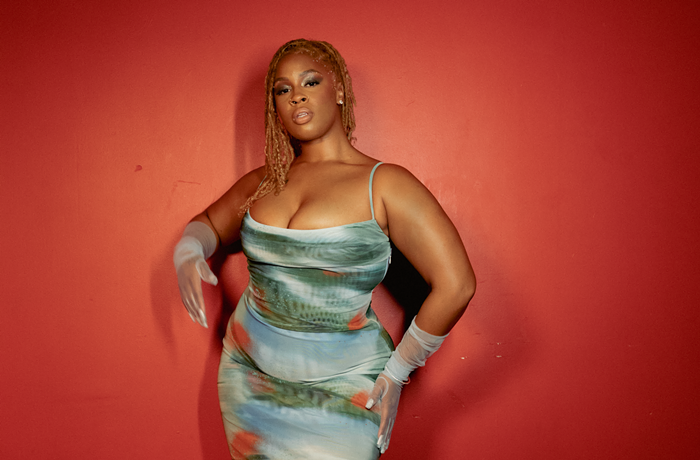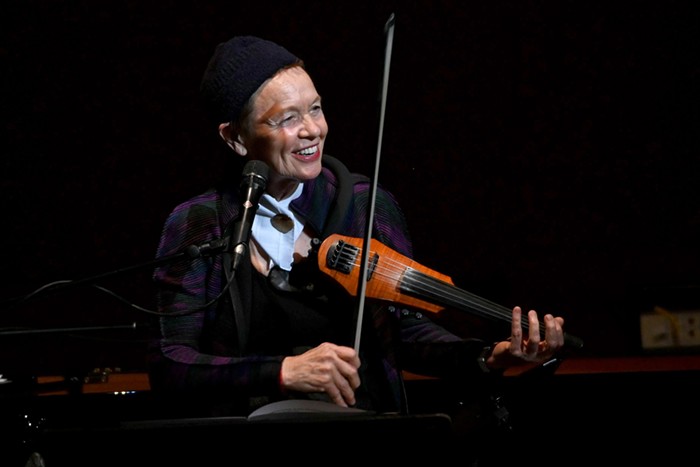
It's no secret that there is a plethora of terribly named bands out there. Some bastardize grammar, while others are genuinely offensive or reveal egregious tone-deafness to painful histories.
Portland Mercury Music Editor Ciara Dolan and Stranger Music Calendar Editor Kim Selling even took it upon themselves to catalogue a disturbing number of bands using sexist and misogynistic monikers.
But can a band's name be used to reclaim a racist term as a tool for self-empowerment?
Enter: The Slants, an all-Asian rock band based out of Portland, Oregon, whose bass guitarist, Simon Shiao Tam, has waged an eight-year battle—including a recent case in the United States Supreme Court—against the federal Patent and Trademark Office to register his group's name as a trademark. Tam said a decision is expected in June. If he is successful, his case could set a precedent allowing members of groups such as local all-women rock band Thunderpussy to register their name or the infamous Washington Redskins to maintain its trademarks.
"I realized there is power in identity and claiming that for yourself," Tam told a roomful of University of Washington law students during a campus talk on Wednesday.
Tam, 36, said his decision to name the band the Slants was inspired by Quentin Tarantino’s Kill Bill. The film marked the first time he’d ever seen Asians depicted as powerful and sexy, rather than weak, he said.
The name was his chance to “re-appropriate” a term once used to demean people who looked like him, Tam said. Zahr Said, a UW associate law professor and faculty director of the Center for the Advanced Study and Research on Innovation Policy, said Tam’s story humanizes trademark law.
“It's hard to convey to students how big a deal it is to litigate—how long it takes, how it impacts your body, your soul,” said Said. “It's even harder talking about something that’s racially charged and talks about identity issues.”
I met with Tam to talk about racism, the near decade he’s spent fighting for the Slants' trademark, and his mission to increase visibility for the Asian community.
What reaction did other Asian folks have to your band's name?
Not everyone is going to agree with it. We're not a monolithic group. We all have drastically different experiences, especially when you consider that our identity is divided up based on geography, unlike skin color or language. You also add into the mix that people have assimilated at different levels.
How has not having a trademark affected the Slants?
A lot of the time, major record labels won't actually sign bands who don't have an actual registered mark. That's because they don't want to invest a lot of money into an act, only to have it not be protected.
I was on a panel with somebody who was an attorney for Sony or Capitol Records somewhere and they were talking about how they were working on Destiny's Child back in the day. Back then, they were called Destiny. And the label told [the group], "You can't do that. There's six other people called Destiny. It's too generic." Unless they changed it, they weren't getting the deal. So then they changed it to Destiny's Child and I guess you could say things kind of worked out for the people involved. But everyone was willing to walk away from it because of the lack of registration. That's how big of a deal it is.
I don't think our biggest battle is with that. Our battle is more with the racist entertainment industry—people who think Asian American bands aren't compelling or won't sell. If you look at this through the lens of this case, my battle is that I've invested so much of my time, money, and energy into reading and writing and doing research for law briefs instead of writing music and performing.
I'm the only original band member left.
Why does trademarking this name mean so much to you?
We can use the name to address this false stereotype people have and talk about our own perspective, our own slant on life to talk about what it's like to be people of color. In Helen Zia's book Asian American Dreams, there's all these badass Asian Americans doing groundbreaking things. This is a way to pay homage to what they've been doing with the word "slant" for the past 30 years.
Are you concerned that your trademark case would undermine the work to get the Washington Redskins to change its name?
The reason I've been more comfortable with the notion that it might inadvertently help [team majority owner Daniel Snyder] out if we win is that at the end of the day, we can't be blinded with our obsession to punish people like him who are willing to accept that the collateral damage is actually experienced by marginalized communities.
The law we're fighting is disproportionately used against communities of color and members of the LGBTQ community because we tend to be the communities who re-appropriate language and reclaim formerly offensive things. This basically makes us prime targets for the law.
The other part of it is that, not only are we prime targets, it's also allowing the government to justify the denial of benefits based on race, religion, political ideology, and so on.
We went to the trademark office at one point and said, "Hold on. 'Slant' means a lot of different things. You've registered it hundreds of times before, so why this band?" My case is the only one in U.S. history to be denied a trademark registration on the premise that it's racist toward Asians. The trademark office says, "It is incontestable that the applicant is of Asian descent and part of an Asian band, thus the association." In their minds, the more Asian we became, the more offensive we became.
Wait, what?
Any racial slur you can think of for an Asian is a registered trademark right now.
As Asian American, the term "chink" is probably the most venomous to me. It's been registered like eight times! The only guy to be denied [registering] "chink" is an Asian American activist named Randall Loo, who tried to get a t-shirt company off the ground called Chink Proud. He was denied and had to shut his company down.
You've clearly done a lot of research.
The standards change depending on who gets your application—and that's really weird and messed up. That's not a good way to run government.
Believe me, I completely understand why people want to keep [this law] in place. They like the status quo because they think it's their only protection. But to me, that's not the case.
[Patent and Trademark Office officials] aren't doing anything to help fight racism. They're perpetuating racism by keeping terms loaded. If they were genuine about their interest in protecting against racism, they should've began by cancelling registrations for white supremacist groups like the KKK or Stormfront instead of choosing bands. But they've never indicated any interest in doing that.
Do you see this as a free speech issue?
For me, it's more about the moral and ethical idea. If anything, it's really distasteful that [federal officials] are using their identities against [marginalized people]. This reminds me of what people told my sister, who is gay, "You can live with your girlfriend, you just can't marry her." Or to go further back, "You can still ride the bus, you just have to ride in the back."
This law chills speech. If you want to fight hate speech, you don't censor it. You find better speech and more nuanced speech. If we censor certain types of words, who knows who inadvertently becomes the target of the law?
This is the same government who passed laws against [immigration into the U.S.] for people of Chinese descent. The same government who put people in concentration camps for looking Japanese.
Is there a point where you say, "I'm done. We need to change our name?"
More than anything, I'm really stubborn. I'd probably keep the band name out of principle. The concept of the Slants existing is more important than me, more important than the band itself. We need to have something to say that Asian Americans have the right to decide what's best for themselves and, at the end of the day, even if we lose, we don't have to bow. We don't have to concede at all.


















